The Strange One Blu-ray Movie
HomeThe Strange One Blu-ray Movie 
End as a Man | Indicator Series | Limited EditionPowerhouse Films | 1957 | 1 Movie, 2 Cuts | 100 min | Rated BBFC: PG | Apr 27, 2020
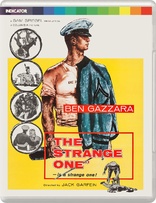
Movie rating
6.8 | / 10 |
Blu-ray rating
| Users | 0.0 | |
| Reviewer | 3.5 | |
| Overall | 3.5 |
Overview
The Strange One (1957)
Ben Gazzara stars as Cadet Sgt. Jocko DeParis, a sadomasochistic bully in a Southern military academy who uses his magnetism and the school's own military code to manipulate his fellow cadets and officers. When he engineers the expulsion of a hated rival, his reign of terror begins to unravel.
Starring: Ben Gazzara, Pat Hingle, Peter Mark Richman, Arthur Storch, Paul E. RichardsDirector: Jack Garfein
| Film-Noir | Uncertain |
| Drama | Uncertain |
Specifications
Video
Video codec: MPEG-4 AVC
Video resolution: 1080p
Aspect ratio: 1.85:1
Original aspect ratio: 1.85:1
Audio
English: DTS-HD Master Audio Mono
Subtitles
English SDH
Discs
Blu-ray Disc
Single disc (1 BD)
Playback
Region B (locked)
Review
Rating summary
| Movie | 3.5 | |
| Video | 4.0 | |
| Audio | 4.0 | |
| Extras | 3.0 | |
| Overall | 3.5 |
The Strange One Blu-ray Movie Review
Can you handle the truth?
Reviewed by Dr. Svet Atanasov September 11, 2020As memorably portrayed by Jack Nicholson (who earned an Academy Award nomination in the role), United States Marine Corps Colonel Nathan R. Jessup entered the annals of all time great lines of dialogue from the movies when he uttered the unforgettable indictment, "You can't handle the truth" in Rob Reiner's 1992 opus (written by Aaron Sorkin) A Few Good Men. That phrase has become so embedded in the public consciousness that ironically some may not remember what "truth" Jessup asserted couldn't be handled, namely one that was bound up at least in part with how callously some members of the Armed Forces are treated by those who are supposedly their very comrades. The Strange One plies at least somewhat of the same territory as A Few Good Men does, albeit from a totally different perspective, as it focuses on a cadet Staff Sergeant named Jocko De Paris (Ben Gazzara) whose martinet tendencies with his charges have made him both admired and hated. In this particular film, there's really no "mystery" as to what has led to the fate of a cadet, as it's depicted quite overtly that De Paris' machinations led to the man's expulsion (which at least is not tantamount to the murder at the heart of A Few Good Men). One of the things that A Few Good Men so viscerally portrayed was how, in that particular instance, the "fish rotted from the head", as it were, but The Strange One might be thought of as a "fractal" version of that aspect, in that Jocko is certainly not of the same rank as Jessup, but he's just as toxic, and arguably more so, since he interacts personally with "his" underclassmen more intimately (and that's a deliberately chosen word) than someone like a Colonel might.
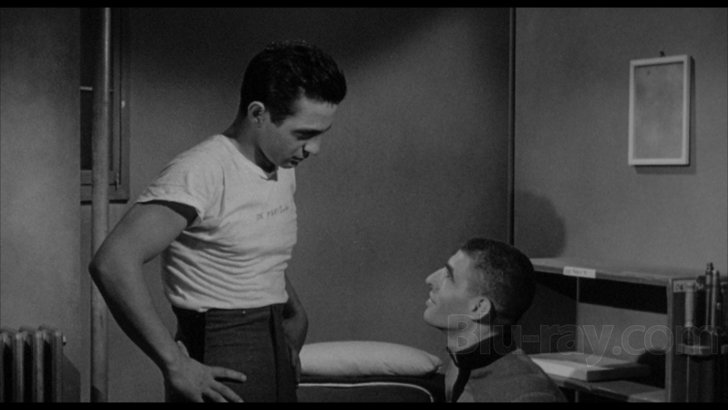
Eureka Entertainment relatively recently put out the kind of interesting if perhaps problematic (for some, anyway) Syncopation, and my review of that UK release actually pointed to my Syncopation Blu-ray review of a prior U.S. release by Cohen Media Group. That review detailed the interesting "credit roll" for Syncopation, one which emphasized the collaborative spirit between performers and technicians by not actually listing who did what, other than splitting them into "in front of the camera" and "behind the camera" groupings. Speaking of "groupings", that review of the U.S. version related that rather odd decision vis a vis the credits to such performing aggregations as the iconic Group Theatre, where a so-called "collectivist" approach toward productions tended to rule the roost (which is not to say that definite power hierarchies existed, something that may have exacerbated the Group's eventual decline and demise, ironically just about at the same time that Syncopation came out).
While The Strange One has a much more traditional credits sequence (one which commentator Nick Pinkerton likens to Saul Bass, albeit without Bass' involvement), it was a "collectivist" effort as well, and one which can more or less be directly traced back to efforts by the Group Theatre. The Strange One was marketed at the time of its release as the first film done (largely) by both those "in front of the camera" and "behind the camera" who had some affiliation with the Actors Studio (you'll see "Actors" in its possessive form "Actor's" or even "Actors'" in various places, but the organization itself does not use the possessive form). Armchair historians may know that in a very real way The Actors Studio grew out of the ashes of the Group Theatre, and was in fact founded by former Group members who wanted a "new, improved" take on the method(s) (Method?) of Stanislavski as well as a perhaps more felicitous teaching environment than the Group had offered.
The Strange One started life first as a novel and then as a play, both titled End as a Man, with both having been written by Calder Willingham, who also adapted his work for this film version. End as a Man wasn't a gigantic hit when it opened in late 1953, but it ran for several months, and it offered early (and in some cases debut) performances by a number of actors who would later achieve various amounts of stardom, including such names as Anthony Franciosa, Harry Guardino, and Albert Salmi. Ben Gazzara won a Theatre World Award for his participation in the original stage production, and he and fellow original cast members Pat Hingle, Arthur Storch and (Peter) Mark Richman recreate their performances for the film version. This was Gazzara's big screen debut, something shared by co-stars George Peppard and Julie Wilson (as well as Hingle). The film was directed by Jack Garfein, who had helmed the stage version and who was the first director invited into the quasi- repertory company at the Actors Studio.
There's not a huge amount to the plot dynamics in the film, with De Paris depicted as a conniving lout who gets the son of a commanding officer at the military academy expelled in a weird kind of revenge fantasy. De Paris involves a number of underclassmen in his scheme, and the bulk of the film details him trying to keep his "troops" in line as matters of conscience intrude for several of them. What gives The Strange One its decided if perhaps arguably (due to the strictures of its production era) blunted impact is a very noticeable current of homoeroticism which virtually runs rampant just beneath the surface. The psychological aspect of this element is frankly never really explored, and so may admittedly not "add" to the actual meaning of the film, but there's an edginess to the film that manages to peek through otherwise supposedly "mundane" interactions.
My longstanding history into trying to figure out elements of Frances Farmer's turbulent story has perhaps given me an undue amount of interest in the techniques of both the Group Theatre and the Actors Studio, but one of the ironic things that has repeatedly occurred to me is how mannered some of the supposedly "realistic" performances by various adherents to "the Method" have been over the years, at least when seen through the prism of arguably more "naturalistic" (if at times admittedly less visceral) acting styles on display in more contemporary outings. While the supporting cast in The Strange One does largely good, unflashy work, Gazzara's portrayal, while absolutely riveting in its own way, can seem florid and, well, theatrical at times. That's probably nowhere more evident than in the film's over the top climax, which sees Jocko getting his "comeuppance". Interestingly in that regard, the film evidently changes the ending of both the original novel and the stage adaptation. Whether or not that was a wise decision may be debatable, especially considering the rather odd and momentary reference to race relations it introduces.
The Strange One Blu-ray Movie, Video Quality 
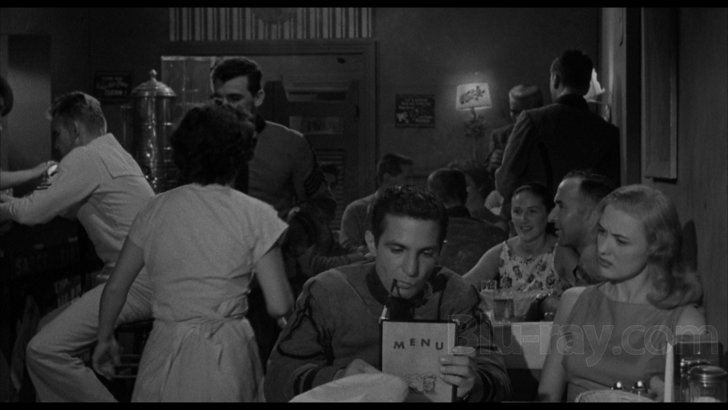
The Strange One is presented on Blu-ray courtesy of Powerhouse Films' Indicator imprint with an AVC encoded 1080p transfer in 1.85:1. As wonderfully thorough as Powerhouse's insert booklets tend to be, they don't always offer the most bounteous information on the provenance of their transfers, and this release's booklet contains only the following pretty generic verbiage on the presentation:
Sony's HD remaster was the source of this Indicator edition. The film's original mono audio was remastered at the same time.The good news is, as fans of high definition material may agree, Sony tends to be one of the more reliable curators of their catalog, and this release offers a nicely organic and filmlike appearance. Burnett Guffey's cinematography almost approaches chiaroscuro in some of the nighttime or dimly lit material, and this presentation offers solid contrast and a deep accounting of blacks. There are a few passing variances in densities, and clarity can also ebb and flow, not always for easily discernable reasons (i.e., some sequences will offer coverage that can alternate between generally good detail and clarity to a somewhat fuzzier look). There are some very minor signs of age related wear and tear, but all in all whatever element was used was either in generally good shape to begin with, or has had any major issues ameliorated or outright eliminated.
The Strange One Blu-ray Movie, Audio Quality 
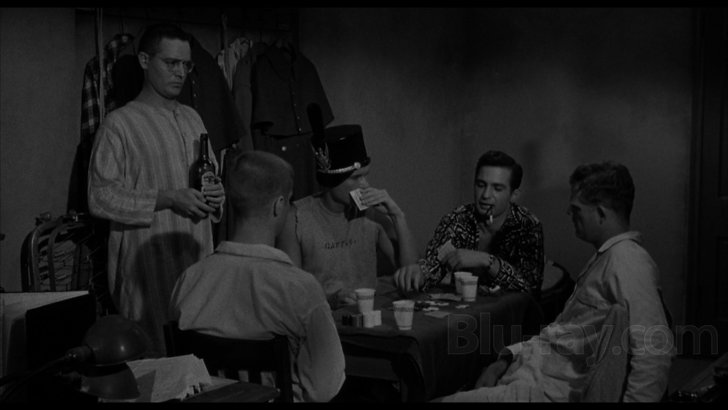
The Strange One features a DTS-HD Master Audio Mono track that capably supports what is in essence a stagebound, very talky enterprise. That said, one of the film's assets is its swingin' jazz score by Kenyon Hopkins, and while the brass elements in Hopkins' orchestrations struck me as sounding just a tad boxy, the overall force of the score is nicely rendered on this track. Dialogue and the occasional ambient environmental effect are presented cleanly and clearly. Optional English subtitles are available.
The Strange One Blu-ray Movie, Special Features and Extras 
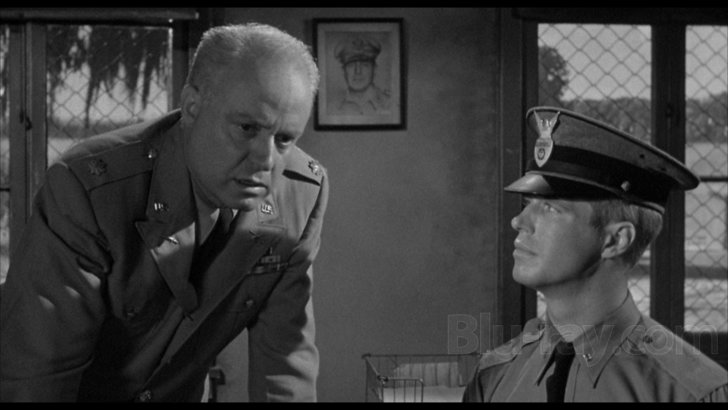
- UK Version (1:39:44) and US Version (1:39:39) differ only in their title cards, with the UK Version adopting the original title of Wallingham's novel and subsequent play. Somewhat hilariously they didn't change the opening credit card which reads "Ben Gazzara as" which then leads to End as a Man in the UK Version. The few extra seconds in the UK Version are due to the introductory inclusion of the censor approval card.
- Audio Commentary by Nick Pinkerton is a really interesting listen, with a bunch of background information of various players as well as director Jack Garfein and the Actors Studio in general. Pinkerton rather oddly seems to think that Sidney Lumet's last name is French.
- Finding Direction: Jack Garfein (HD; 10:11) is a harrowing archival interview with the director (who died late last year) where he details surviving the Holocaust and then later matriculating from acting to directing.
- Ben Gazzara Remembers The Strange One (HD; 10:38) is another archival interview with Gazzara kind of cheekily recalling his "seduction" by the acting profession and his involvement in the original stage version of this property.
- Theatrical Trailer (HD; 2:04) is in pretty rough shape but at least provides evidence of how generally great the transfer of the actual film looks in comparison.
- Image Gallery (HD)
The Strange One Blu-ray Movie, Overall Score and Recommendation 
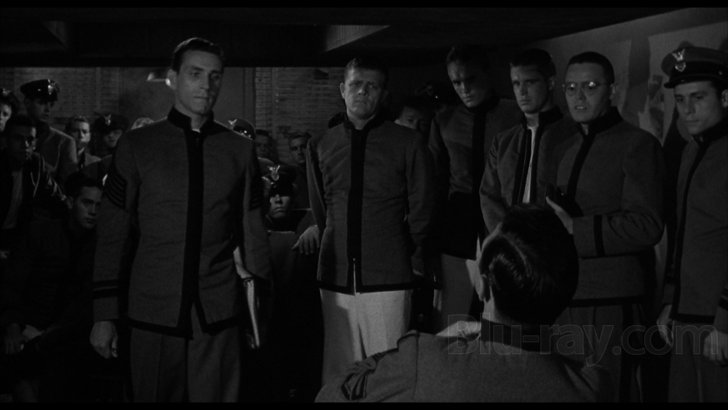
Garfein only made one other feature film, Something Wild, a devastating 1961 drama about a rape survivor starring his wife Carroll Baker. Garfein's sensibilities may have been at least slightly ahead of their time, at least for American audiences, but The Strange One may also be hobbled by the strictures imposed upon it by its very era of production, where some of its subtext couldn't be adequately explored and so is just kind of "there". Gazzara is a force of nature in the title role, and the supporting cast has some really fine work by a retinue of performers who would all soon become better known. Technical merits are solid and the supplementary package very enjoyable. With caveats noted, Recommended.
Similar titles
Similar titles you might also like

Nightmare Alley
1947

Zama
2017

The Dark Mirror
1946

My Name is Julia Ross
Arrow Academy
1945

Beanpole
Дылда / Dylda
2019

House of Bamboo
Masters of Cinema | Limited Edition
1955

Night and the City
Limited Edition
1950

Birdy
Indicator Series
1984

Kes
Masters of Cinema
1969

Sirocco
Indicator Series | Standard Edition
1951

Pioneer
Pionér
2013

Bullhead
Rundskop
2011

Bartleby
Indicator Series | Limited Edition
1970

Sorry We Missed You
2019

Route Irish
2010

The Last of England
1988

Speaking Parts
1989

The Snake Pit
Indicator Series | Limited Edition
1948

Cría Cuervos
Raise Ravens
1976

Lucky
Includes Harry Dean Stanton: Partly Fiction
2017